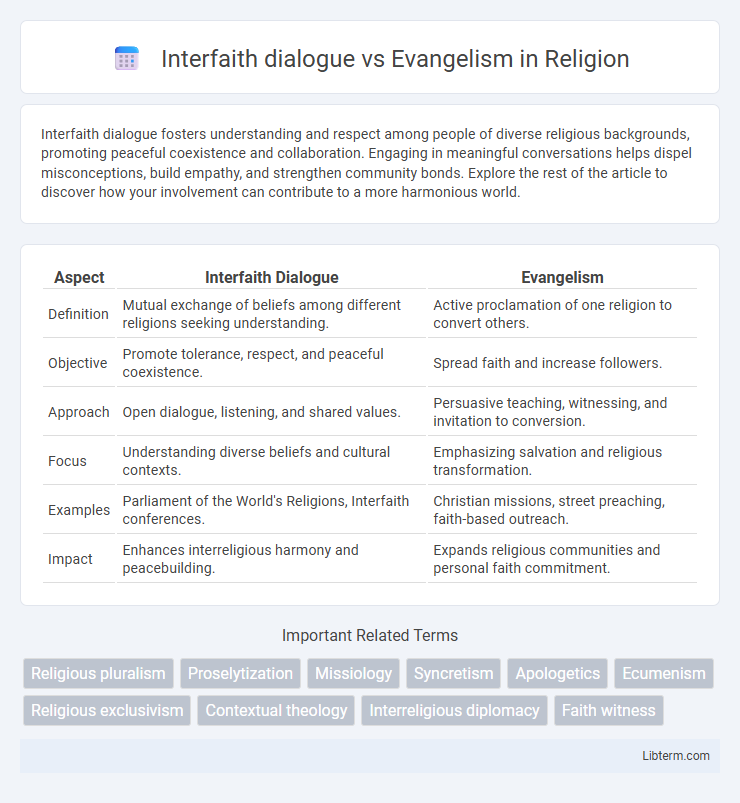Interfaith dialogue fosters understanding and respect among people of diverse religious backgrounds, promoting peaceful coexistence and collaboration. Engaging in meaningful conversations helps dispel misconceptions, build empathy, and strengthen community bonds. Explore the rest of the article to discover how your involvement can contribute to a more harmonious world.
Table of Comparison
| Aspect | Interfaith Dialogue | Evangelism |
|---|---|---|
| Definition | Mutual exchange of beliefs among different religions seeking understanding. | Active proclamation of one religion to convert others. |
| Objective | Promote tolerance, respect, and peaceful coexistence. | Spread faith and increase followers. |
| Approach | Open dialogue, listening, and shared values. | Persuasive teaching, witnessing, and invitation to conversion. |
| Focus | Understanding diverse beliefs and cultural contexts. | Emphasizing salvation and religious transformation. |
| Examples | Parliament of the World's Religions, Interfaith conferences. | Christian missions, street preaching, faith-based outreach. |
| Impact | Enhances interreligious harmony and peacebuilding. | Expands religious communities and personal faith commitment. |
Understanding Interfaith Dialogue: Goals and Methods
Interfaith dialogue emphasizes mutual understanding, respect, and learning between different religious traditions, aiming to build trust and foster peaceful coexistence. It employs open, respectful communication methods such as discussions, workshops, and shared community activities to explore theological similarities and differences without proselytizing. The primary goal centers on enhancing social harmony and cooperation rather than conversion or religious advocacy.
What Is Evangelism? Core Principles and Approaches
Evangelism is the practice of sharing the Christian gospel with the intent to convert individuals to the faith, emphasizing the core principles of salvation through Jesus Christ, repentance, and faith. Key approaches in evangelism include personal testimony, scripture presentation, and relational outreach, aiming to communicate the message clearly and compassionately. Unlike interfaith dialogue, which seeks mutual understanding and respect among different religions, evangelism's primary goal is spiritual transformation and discipleship.
Historical Context: Interfaith Dialogue and Evangelism
Interfaith dialogue emerged prominently in the 20th century as a response to growing religious pluralism and global conflicts, emphasizing mutual understanding and respect among diverse faith traditions. Evangelism, rooted in early Christian missions, focuses on the active proclamation of the Gospel to convert individuals, maintaining a more assertive approach to faith expansion. Historically, interfaith dialogue seeks coexistence and learning, whereas evangelism centers on religious conversion and adherence to specific doctrinal truths.
Key Differences Between Interfaith Dialogue and Evangelism
Interfaith dialogue emphasizes mutual understanding, respect, and learning between different religious traditions without seeking to convert participants, fostering peaceful coexistence and collaboration. Evangelism aims to actively share and promote a particular faith with the intent of converting others to that belief system. The key difference lies in interfaith dialogue prioritizing open communication and acceptance, while evangelism focuses on persuasion and spreading specific religious doctrines.
Theological Perspectives on Interfaith Engagement
Interfaith dialogue emphasizes mutual understanding and respect among different religious traditions, seeking theological common ground without aiming to convert participants. Evangelism centers on proclaiming and spreading the specific tenets of one faith, often aiming for conversion as a theological imperative. Theological perspectives on interfaith engagement vary, with some viewing dialogue as a means to enrich faith and others seeing evangelism as essential to fulfilling religious mandates.
Benefits and Challenges of Interfaith Dialogue
Interfaith dialogue fosters mutual understanding, reduces prejudice, and promotes peace by encouraging respectful communication among diverse religious groups. Challenges include navigating theological differences, potential misunderstandings, and resistance from communities wary of diluting their beliefs. Benefits encompass building trust, enhancing social cohesion, and creating opportunities for collaborative social action across faiths.
Effectiveness of Evangelism in a Pluralistic Society
Evangelism in a pluralistic society proves effective by directly addressing diverse audiences with tailored messages that resonate with varied cultural and religious backgrounds. Interfaith dialogue fosters mutual understanding but often lacks the persuasive power inherent in evangelism's call to personal transformation. The strategic use of contextualized communication enhances evangelism's impact by engaging individuals on a personal level, promoting genuine conversion amid religious diversity.
Ethical Considerations in Interfaith and Evangelistic Efforts
Interfaith dialogue emphasizes respect, mutual understanding, and the ethical responsibility to honor diverse religious beliefs without coercion, fostering peaceful coexistence and collaboration. Evangelism prioritizes the ethical challenge of sharing one's faith with sincerity while ensuring respect for others' autonomy and avoiding manipulation or disrespect of different traditions. Balancing truth-claims with empathy and consent remains a critical ethical consideration in both interfaith and evangelistic efforts, promoting integrity and harmony.
Case Studies: Interfaith Dialogue vs. Evangelism in Practice
Case studies reveal that interfaith dialogue fosters mutual understanding and respect by creating neutral spaces for shared values and collaborative problem-solving, such as the Parliament of the World's Religions. Evangelism, exemplified by initiatives like missionary outreach in Africa, prioritizes conversion and proclamation of specific religious beliefs, often leading to more unilateral interactions. These contrasting approaches illustrate that interfaith dialogue emphasizes coexistence and learning, while evangelism centers on religious expansion and individual commitment.
Building Bridges: Finding Common Ground for Religious Cooperation
Interfaith dialogue emphasizes understanding and respect among diverse religious traditions, fostering mutual respect and cooperation rooted in shared values such as compassion and justice. Evangelism focuses on sharing specific faith beliefs with the intent to inspire conversion, often highlighting the distinctiveness of a single religious truth. Building bridges through interfaith dialogue cultivates collaborative efforts for social harmony and peace, creating common ground where religious cooperation transcends doctrinal differences.
Interfaith dialogue Infographic

 libterm.com
libterm.com